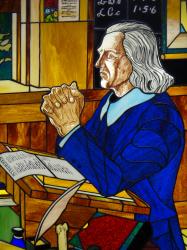1671 - 1718 Person Name: J. B. Freystein Hymnal Number: 155 Author of "Mache dich, mein Geist, bereit, wache" in Ein Unpartheyisches Gesang-Buch Freystein, Johann Burchard, son of A. S. Freystein, vice-chancellor of Duke August of Saxony and inspector of the Gymnasium at Weissenfels, was born at Weissenfels, April 18, 1671. At the University of Leipzig he studied law, mathematics, philosophy and architecture. He resided for some time at Berlin and Halle and then went to Dresden as assistant to a lawyer. After graduating L.L.D. at Jena in 1695, he began an independent legal practice at Dresden. In 1703 he became Rath at Gotha, but returned to Dresden in 1709 as Hof-und Justizrath, and was also, in 1713, appointed a member of the Board of Works. Enfeebled by his professional labours, he died of dropsy at Dresden, April 1, 1718 (Bode, p. 70; Blätter für Hymnologie, 1884, pp. 22-24; Koch, iv. 222). Of the six hymns of this pious lawyer and disciple of Spener, five seem to have first appeared in the Merseburg Gesang-Buch, 1716. The other (which has been translated into English) is:—
Mache dich, mein Geist, bereit. [Watchfulness.] This fine hymn, a stirring call to fight against the World, the Flesh, and the Devil, founded on St. Matthew xxvi. 41; first appeared in the Geistreiches Gesang-Buch, Halle, 1697, p. 393, in 10 stanzas of 8 lines, entitled, "On the words Watch and Pray." It was repeated in Wagner's Gesang-Buch, Leipzig, 1697, vol. iv. p. 1280; in Freylinghausen's Gesang-buch, 1704, and many later collections, and in the Unverfälschter Liedersegen, 1851.
The translations in common use are:—
1. Rise, my soul, to watch and pray, omitting stanzas 2, 4, 8, 10, by Miss Winkworth in her Chorale Book for England, 1863, No. 125, repeated in J. Robinson's Collection, 1869, No. 10.
2. Up, my soul, gird thee with power, omitting st. iv.-vi., by E. Cronenwett, as 396 in the Ohio Lutheran Hymnal, 1880.
Other translations are: (l) "O my soul, with prayers and cries," in Lyra Davidica, 1708, p. 53. (2) "Wake, my soul, wake up from sleep," by J. S. Stallybrass in the Tonic Solfa Reporter, January, 1859. (3) “Have thy armour on, my soul," by Miss Burlingham in the British Herald, Feb. 1865, p. 29.
The hymn "O my spirit, wake, prepare," by A. T. Russell, as No. 104 in the Dalston Hospital Hymn Book, 1848, and repeated as No. 196 in Dr. Pagenstecher's Collection, 1864, while not a translation, is based on st. iii., viii., ix. of the German. [Rev. James Mearns, M.A.]
--John Julian, Dictionary of Hymnology
Johann Burchard Freystein


 My Starred Hymns
My Starred Hymns


